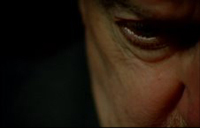
The Salariat in Parts
Zachary Epcar - 2009, 11:18, 16mm/DV, San Francisco, CA
An office comedy of sorts, describing several points of correspondence between the material space of the office and the gastro-intestinal movements of its inhabitants. Some of the more discreet transactions of office life are enacted: the massaging of temples, the exchanging of fluids, the sublimating of desires, the ingesting of products promising digestive relief in a timely manner.
Zachary Epcar is a film and video maker, born and raised in San Francisco, California, and a recent graduate of the Bard College Film and Electronic Arts Program in New York State.
Questions with Zachary Epcar by Liz Wing
Liz Wing: The film has a very particular look to it, almost as though it were set twenty years ago or more (a pre-computerized world). Where did you film it, and what guided you in making these kinds of artistic choices?
Zachary Epcar: The film was shot on a set I assembled in a studio at Bard College. I was much less concerned at the time with assigning the office to any particular era than with avoiding what has become such a tired, completely standardized way of representing that space; the idea was that there is something beyond boredom and inanity, beyond the white walls and the identical cubicle stations, the malfunctioning copy machines and the oafish bosses-- the office as a site of transformation, where things like alka-seltzer and pepto bismol treat symptoms of much larger, much more severe bodily disfigurations.
LW: The sound design is powerful and surreal! Did this take a great deal of effort and planning? Did you learn some new tricks?
ZE: Quite a bit of tinkering was involved, late nights in my apartment, almost exclusively in my underpants (this is key), with sound recorder in hand, grunting, moaning, stamping, spilling milk, close-miking everything. Foley sound is a marvelous way of exercising control, of isolating and intensifying the aural as one might the visual. A big thanks to Samuel Breslin for sending my way one very special recording he made which turned out to be just what was missing and just what I needed.
LW: Many of the objects your characters use and and activities they do seem symbolic or iconic (the water cooler, Pepto Bismol and Alka-Seltzer, coffee, ficus trees, endless document stamping) of white-collar working life. Are these observations personal, or are they taken from others' experiences or expressions in media?
ZE: I have worked in offices before for brief stints, but this is no confessions of an administrative assistant-- it's speculative, it's what I see happening even if what I see happening isn't actually happening or, perhaps more accurately, just isn't seen.
